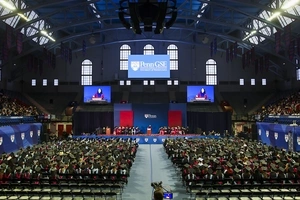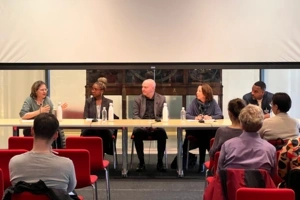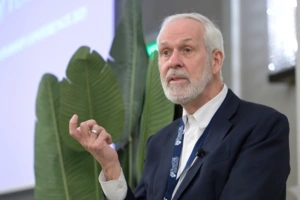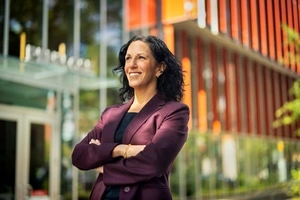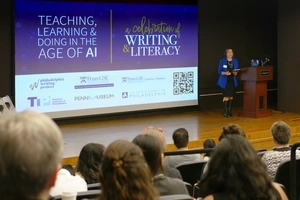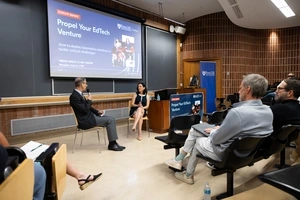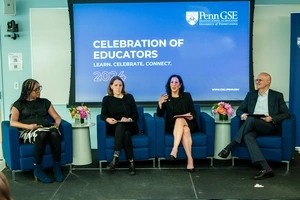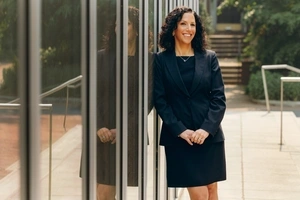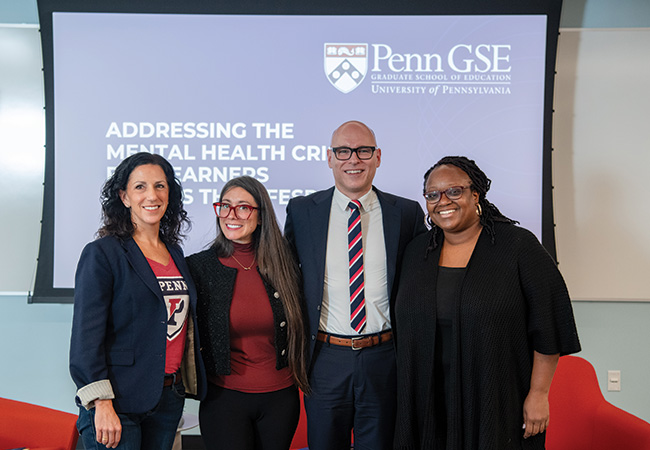Biography
Katharine O. Strunk is the Dean of the Graduate School of Education and the George and Diane Weiss Professor of Education at the University of Pennsylvania. She is nationally renowned for her partner-driven research and leadership, which brings multimethod, collaborative scholarship to bear on the most pressing questions facing education and educators.
Since joining Penn GSE as dean in 2024, Dr. Strunk has led the development and launch of Together for Good, a strategic vision that builds on the School’s strengths to respond to urgent needs in the field, uplift every learner, and transform education into an enduring public good. Under her leadership, Penn GSE has expanded and deepened partnerships with the School District of Philadelphia to support teacher development, leadership pipelines, and evidence-informed practice. Recent initiatives include a districtwide effort to bolster Algebra 1 instruction, new collaborations to support the implementation of AI in public schools, the launch of The Academy @ Penn, and coordinated research to address urgent priorities identified by the District. At the University level, Dr. Strunk co-chaired Penn’s Presidential Commission on Countering Hate and Building Community, helping to guide a comprehensive set of recommendations to strengthen inclusion, safety, dialogue, and belonging across campus.
Dr. Strunk partners extensively with district and state policymakers nationwide, including work with the School District of Philadelphia, the Los Angeles Unified School District, and the California and Michigan Departments of Education. She served as the only researcher on Michigan Governor Gretchen Whitmer’s Student Recovery Advisory Council, which informed COVID-19 recovery efforts in schools statewide, and has advised on numerous major local and state education reforms.
Dr. Strunk was elected to the National Academy of Education in 2026. She also served as president of the Association for Education Finance and Policy (AEFP) in 2021–2022. She is a member of the Executive Leadership Board for the National Center for Research on Education Access and Choice (REACH). From 2017 to 2023, she served as director of the Education Policy Innovation Collaborative (EPIC) at Michigan State University, which partners with the Michigan Department of Education and local school districts to craft targeted research that is a priority for policymakers and educators.
Prior to joining Penn GSE, Dr. Strunk was the Clifford E. Erickson Distinguished Chair in Education and a professor of education policy and, by courtesy, economics at Michigan State University. From 2009 to 2017 she served on the faculty of the University of Southern California’s Rossier School of Education and Sol Price School of Public Policy. She began her career at the University of California at Davis School of Education, where she served on the faculty from 2007 to 2009.
Education
- Ph.D. (Education Administration and Policy Analysis) Stanford University, 2007
- M.A. (Economics) Stanford University, 2005
- B.A. (Public Policy) Princeton University, 1999
Areas of Expertise
- K–12 education governance
- Teachers’ unions and collective bargaining agreements
- Portfolio management models
- Teacher labor markets
- School turnaround policies
Links
Research Interests and Current Projects
Dr. Strunk is an award-winning expert on K–12 education governance, including teachers’ unions, collective bargaining agreements, and portfolio management models, as well as teacher labor markets, school turnaround, and accountability policies. Rooted in the fields of economics and public policy, her work centers on structures that are central to state and district operations and policy and the ways these structures affect policymakers’ decisions and outcomes. In her research, she pays particular attention to the ways that policies and programs impact the most traditionally underserved communities.
Dr. Strunk’s research has been published in leading peer-reviewed journals as well as through numerous policy reports written in service of improving policy and practice. She is a co-author of Challenging the One Best System (2020, Harvard Education Press), which offers a comparative analysis of the set of urban education governance reforms collectively known as the “portfolio management model.”
In her current research, she focuses on working with local and state education agencies on studies that will help them inform policy and practice. Her work has been supported by state and federal contracts and grants as well as by philanthropic partners. She has raised more than $21 million in extramural funding over the course of her career.
Publications
Peer-Reviewed Journal Articles & Books (2018–present)
Wood, W. J., Lai, I., Filosa, N. R.*, Imberman, S. A., Jones, N. D., & Strunk, K. O. (2025). Are effective teachers for students with disabilities effective teachers for all? Educational Evaluation and Policy Analysis, 47(2), 355–259. https://doi.org/10.3102/01623737231214555
Wright, T., Bruner, L., Cummings, A.*, & Strunk, K. O. (2024). Understanding K–3 teachers’ literacy instructional practices during the pandemic-impacted 2020–2021 school year. Reading Research Quarterly, 59(1), 124–146. https://doi.org/10.1002/rrq.523
Austin, W., Figlio, D., Goldhaber, D., Hanushek, E. A., Kilbride, T., Koedel, C., Lee, J. S., Lou, J., Ozek, U., Parsons, E., Rivkin, S. G., Sass, T. R., & Strunk, K. O. (2023). Academic mobility in U.S. public schools: Evidence from nearly three million students. Journal of Public Economics, 228, Article 105016. https://doi.org/10.1016/j.jpubeco.2023.105016
Harbatkin, E., Strunk, K. O., & Mcilwain, A.* (2023). School turnaround in a pandemic: An examination of the outsized impact of COVID-19 on low-performing schools and their communities. Economics of Education Review, 97, Article 102484. https://doi.org/10.1016/j.econedurev.2023.102484
Burns, J. A.*, Strunk, K. O., Torres, C., Mcilwain, A.*, Harbatkin, E.,* & Waldron, S. F.* (2023). The efficacy and implementation of Michigan’s partnership model of school and district turnaround: Mixed-methods evidence from the first two years of reform implementation. Educational Evaluation and Policy Analysis, 45(4), 622–654. https://doi.org/10.3102/01623737221141415
Strunk, K. O. (2023). An invitation to discomfort in pursuit of diversity, inclusion, & excellence (AEFP Presidential Essay). Education Finance and Policy, 18(2), 173–180. https://doi.org/10.1162/edfp_a_00396
Cummings, A.,* Strunk, K. O., & De Voto, C. (2023). "A lot of states were doing it": The development of Michigan’s Read by Grade Three law. Journal of Educational Change, 24(1), 107–132. https://doi.org/10.1007/s10833-021-09438-y
Dhaliwal, T. K.,* Lai, I.,* & Strunk, K. O. (2023). Round and round they go: The relationship between changing grades and schools and teacher quality, retention, and absence rates. Educational Evaluation and Policy Analysis, 45(2), 285–310. https://doi.org/10.3102/01623737221111800
Sutherland, D.,* Strunk, K. O., Nagel, J.,* & Kilbride T. (2023). Boxed in: Structural limitations to flexible placing in Michigan competency-based education pilot districts. Journal of Educational Change, 24(4), 837–869. https://doi.org/10.1007/s10833-022-09466-2
Goldhaber, D., Imberman, S., Strunk, K. O., Hopkins, B.,* Brown, N., Harbatkin, E.,* & Kilbride, T. (2022). To what extent does in-person schooling contribute to the spread of COVID-19? Evidence from Michigan and Washington. Journal of Policy Analysis and Management, 41(1), 318–349.
Strunk, K. O., Cowen, J., Goldhaber, D. G., Marianno, B., Kilbride, T., & Theobald, R. (2022). Public school teacher contracts and state-level reforms: Assessing changes to the restrictiveness of collective bargaining agreements across three states. American Educational Research Journal, 59(3), 538–573.
Anderson, K.,* Cowen, J., & Strunk, K. O. (2022). Estimating the impact of teacher labor market reforms on student achievement: Evidence from Michigan. Education Finance & Policy, 17(4), 666–692.
Grossmann, M., Reckhow, S., Strunk, K. O., & Turner, M. (2021). All states close but red districts reopen: The politics of in-person schooling during the COVID-19 pandemic. Educational Researcher, 50(9), 637–648.
Barrett, N., Strunk, K. O., & Lincove, J. A. (2021). When tenure ends: The short-run effects of the elimination of Louisiana’s teacher employment protections on teacher exit and retirement. Education Economics, 29(6), 559–579.
Bulkley, K., Torres, A. C., Marsh, J. A., Hashim, A., Woodward, S.,* Strunk, K. O., & Harris, D. (2021). From central office to portfolio manager in three cities: Responding to the principal-agent problem. American Journal of Education, 127 (August), 597–626 . https://www.journals.uchicago.edu/doi/10.1086/715034
Hashim, A.,* Bush-Mecenas, S. C.,* Strunk, K. O., & Marsh, J. A. (2021). Does autonomy matter? Findings from a district experiment in portfolio management. Leadership and Policy in Schools.
Marianno, B., Bruno, P.,* & Strunk, K. O. (2021). Teachers’ union contracts and the productive efficiency of school districts: Longitudinal evidence from California. Sage Open, January–March 2021, 1–16.
Marsh, J. A., Albright, T. N.,* Brown, D.,* Bulkley, K. E., Strunk, K. O., & Harris, D. N. (2021). The process and politics of educational governance change in New Orleans, Los Angeles, and Denver. American Educational Research Journal, 58(1), 107–159.
Lai, I.*, Wood, W. J.,* Imberman, S. A., Jones, N., & Strunk, K. O. (2021). Teacher quality gaps by disability and socioeconomic status: Evidence from Los Angeles. Educational Researcher, 50(2), 74–85.
Bulkley, K., Marsh, J. A., Strunk, K. O., Harris, D., & Hashim, A. (2020). Challenging the one best system: The portfolio management model and urban school governance. Harvard Education Press. (Winner of the 2022 American Education Research Association Districts in Research and Reform SIG Outstanding Publication Award.)
Bush-Mecenas, S.,* Marsh, J. A., & Strunk, K. O. (2020). Guiding principals: Middle-manager coaching and human capital reform. Teachers’ College Record, 122(10).
Goldhaber, D., Strunk, K. O., Brown, N., Naito, N., & Wolff, M. (2020). Teacher staffing challenges in California: Examining the uniqueness of rural and remote school districts. AERA Open, 6(3), 1–16.
Bruno, P.,* Rabovsky, S.,* & Strunk, K. O. (2019). Taking their first steps: The distribution of new teachers in school and classroom contexts and implications for teacher effectiveness and growth. American Educational Research Journal, 57(4), 1688–1729.
Bruno, P.,* & Strunk, K. O. (2019). Making the cut: The effectiveness of teacher screening and hiring in the Los Angeles Unified School District. Educational Evaluation and Policy Analysis, 41(4), 426–460.
Brunner, E., Cowen, J., Strunk, K. O., & Drake, S.* (2019). Teacher labor market responses to statewide reform: Evidence from Michigan. Educational Evaluation and Policy Analysis, 41(4), 403–425.
Strunk, K. O., & Marianno, B. D.* (2019). Negotiating the Great Recession: How do teacher collective bargaining agreements change in times of financial duress? AERA Open, 5(2), 1–18.
Strunk, K. O., Cowen, J., Goldhaber, D., Marianno, B.,* Kilbride, T.,* & Theobald, R. (2018). It is in the contract: How the policies set in teachers’ unions’ collective bargaining agreements vary across states and districts. Educational Policy, 32(3), 280–310.
Strunk, K. O., Goldhaber, D., Knight, D. S.,* & Brown, N.* (2018). Are there hidden costs associated with conducting layoffs?: The impacts of RIFs and layoffs on teacher effectiveness. Journal of Policy Analysis and Management, 37(4), 755–782.
Marianno, B. D.,* & Strunk, K. O. (2018). The bad end of the bargain? Revisiting the relationship between collective bargaining agreements and student achievement. Economics of Education Review, 65, 93–106.
Hashim, A. K.,* Strunk, K. O., & Dhaliwal, T.* (2018). Justice for all? Exploring the differential effects of the Los Angeles Unified School District’s restorative justice policy on student suspensions. Peabody Journal of Education, 93(2), 174–189.
Lincove, J. A., Barrett, N., & Strunk, K. O. (2018). Lessons from Hurricane Katrina: The employment effects of the mass dismissal of New Orleans teachers. Educational Researcher, 47(3), 191–203.
Hashim, A.,* Strunk, K. O., & Marsh, J. A. (2018). The new school advantage? Examining the effects of new school openings on student achievement. Economics of Education Review, 62, 254–266.
Marianno, B.,* Theobald, R., Kilbride, T.,* Strunk, K. O., Cowen, J., & Goldhaber, D. (2018). Cut from the same cloth? Comparing urban CBAs within states and across the U.S. Educational Policy, 32(2), 334–359.
Note: * indicates graduate student and postdoctoral scholar co-authors
Related News
Membership in the NAEd is widely recognized as one of the highest honors in the field of education research, and Dean Strunk joins 10 recent Penn GSE faculty members in being recognized.
- `
-
Dean Strunk shares her views on how university leaders can build lasting partnerships
In the Media | District Administration
TopicsDean Strunk says that developing strong partnerships is person-dependent and takes time to build trust and repair past areas that may be lacking in trust.
-
In EdSurge, Dean Katharine Strunk weighs in on a poll showing teachers are burnt out but still love their jobs.
-
Philly schools partner with Penn for new college and career initiative
In the Media | Philadelphia Tribune
The Academy at Penn initiative is featured at a press conference with the School District of Philadephia.
-
Penn GSE will work with the School District of Philadelphia and Neubauer Family Foundation to support math instruction for students. Dean Katharine Strunk says, “We are honored to support teachers with the tools, training, and strategies that will help their students thrive in this critical subject.”
-
EdWeek digs into a new study on 3rd grade retention and reading outcomes by Dean Katharine Strunk.
-
On May 17, in the Palestra, Penn GSE commemorated the achievements of the roughly 700 master’s and doctoral graduates at this year’s Commencement ceremony.
-
Educators and scholars explored how educators can model democratic engagement while honoring student voice and diverse perspectives.
-
$8 Million Funded Project Partnership between Foundations, Inc., Penn’s Graduate School of Education, the Consortium for Policy Research in Education at Penn GSE, and The School District of Philadelphia. Schools Have Begun Selecting Students for First Cohort
-
Two Philly high schools were chosen for an $8M project to get more kids college and career ready
In the Media | The Philadelphia Inquirer
Penn GSE is investing $8 million in two Philadelphia high schools to support underserved students, aiming to improve college and career readiness through intensive academic and emotional support, with Dean Katharine O. Strunk highlighting its focus on enhancing life outcomes.
-
Topics
This year’s theme, “The Leadership Moment,” addressed significant challenges in the field, from the enrollment cliff to school mergers and acquisitions and speech freedom.
-
She has a bold vision for the future of Penn GSE that builds on the School’s strengths, responds to pressing needs, and aims to change the world.
-
Eight Penn GSE faculty feature prominently in the rankings, which celebrate the most influential education researchers in the nation.
-
The PASS program equips educators, school leaders, and administrators with AI-driven tools to enhance learning, drive innovation, and prepare students for a tech-driven future.
-
Katharine O. Strunk said the PASS program aims to prepare educators and students for a tech-driven future by fostering creativity, critical thinking, and responsible AI use.
-
At a celebration for the public launch of the School’s new strategic vision, the superintendent joined the dean to discuss how the district and Penn GSE can partner to recruit, retain, and support educators amidst a national shortage.
-
Launching Fall 2025, this fully online program prepares professionals to integrate AI and learning science, driving innovation in education globally.
-
Nominations for the 2025 McGraw Prize are now open.
-
This week, Dean Strunk announced the School’s strategic vision, Together for Good.
-
K–12 and college educators discussed the promise and pitfalls of AI at the conference.
-
“Propel Your EdTech Venture” brought together researchers, entrepreneurs, U.S. Department of Education officials, and corporate leaders to learn strategies, drive sustainable growth, and put research into practice.
-
Penn GSE’s annual Alumni Weekend event featured a faculty panel discussion on “The Price of Education” and celebrated the winners of the Education Alumni Awards.
-
Katharine O. Strunk, dean of the Penn GSE, joins her fellow deans from prominent Pennsylvania institutions in highlighting the state's teacher shortage crisis.
-
Topics
In a Philadelphia Inquirer story, Strunk highlighted the importance of equitable stipends in supporting Pennsylvania’s future educators.
-
Sustainable upgrades include green roofs, terra cotta and aluminum shading elements, mechanical system updates, and greater use of natural light, combining for 40 percent annual energy use savings.
-
Gerald Campano will also be honored with a lifetime achievement award for his professional achievements and mentorship work.
-
While teacher turnover peaked in 2022, the attrition rate remains stubbornly high.
-
A new year means a new version of the RHSU Edu-Scholar Public Influence Rankings, with the 2024 edition announced yesterday by Education Week. Nine researchers from the University of Pennsylvania made the annual 200-member list, which was created by Rick Hess of the American Enterprise Institute (AEI) to gauge the public impact of ed scholars’ contributions.
-
Benoit Dubé, Noémie Le Pertel, GRD’21, and Ariane Thomas discuss mental health across the learning lifespan with Dean Katharine Strunk.
-
Amid the aftermath of pandemic-induced disruptions, college students are grappling with significant challenges in mastering basic math skills, a consequence of the shift to remote schooling. These setbacks have left a particularly pronounced impact on vulnerable student groups, says Dean Strunk.
-
Denver education research going forward but not without a fight
In the Media | Chalkbeat Colorado
Dean Katharine Strunk says data has grown increasingly political with the general polarization around public education; she says data does not need to be weaponized.
Journal Editorial Boards
Educational Evaluation and Policy Analysis
Editorial Board
Education Finance and Policy
Editorial Board
Journal of Education Finance
Editorial Board



